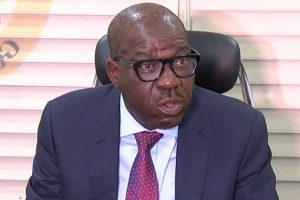Ifeanyi Onuba
When President Bola Tinubu took over the mantle of leadership as Nigeria’s President on May 29, this year, his agenda for the economy was loud and clear- to target a higher Gross Domestic Product growth rate and to significantly reduce unemployment.
To achieve this, one of the things the President listed in his inaugural speech that he would do was to pursue an industrial policy that will utilize the full range of fiscal measures to promote domestic manufacturing and lessen import dependency.
This is expected to be achieved by making electricity more accessible and affordable to businesses and homes alike.
According to Tinubu “Power generation should nearly double and transmission and distribution networks improved. We will encourage states to develop local sources as well.”
The failure of successive administrations to solve the power sector problems even with the privatisation has been a big embarrassment to Nigerians.
Like a stubborn ailment that has continued to defy treatment, the Nigerian power sector, which has undergone different levels of diagnosis and treatments appears to be resistant to the harvests of interventions from the public and the private sector since Nigeria attained its independence in 1960.
Whatever the situation, the reality today is that many Nigerians do not have access to as much power supply as they would want and when they do, it’s not reliable.
Recently, the World Bank estimated that the country would need to connect between 500,000 to 800,000 new households to electricity sources every year up till 2030 to be able to achieve its targets of universal access to electricity for its citizens.
Nigeria is endowed with large oil, gas, hydro and solar resources, and it has the potential to generate 12,522 MW of electric power from existing plants. On most days, however, it is only able to dispatch around 4,000 MW, which is insufficient for a country of over 200 million people.
But that narrative is about to change under the visionary leadership of the Group Chief Executive Officer of the Nigerian National Petroleum Company Limited, Mele Kyari.
Under Kyari’s transformative leadership, the NNPC conceived the idea of monetising Nigeria’s huge gas resources through independent power projects.
To demonstrate this commitment to transforming the Nigeria’s power sector, the NNPC spearheaded by Kyari entered into a turnkey Engineering, Procurement and Construction (EPC) contract with China Machinery Engineering Corporation (CMEC) to construct the Gwagwalada Independent Power Plant project.
The project which was flagged-off on Friday by President Bola Tinubu has been described as a game-changer in Nigeria’s power sector.
It is a 1,350MW Combined Cycle Power Plant with auxiliaries and Balance of Plant to be situated on 547 hectares of land already acquired at Gwagwalada, in the Federal Capital Territory (FCT), Abuja.
The project is expected to generate between $700m and $800m annually within the first ten years of operations.
The GIPP was necessitated by the need for delivering gas towards additional power generation capacity in Nigeria. Under the plan, gas supply to the Plant will be through the Ajaokuta- Kaduna-Kano (AKK) Gas Pipeline Project which is currently at its advanced stages of construction.
The GIPP’s fuel requirements will be satisfied under a long-term Gas Sales, Purchase and Aggregation Agreement with Shell Petroleum Development Company Joint Venture (SPDC JV).
The GIPP project consists up of three power train blocks of 450MW each. Each block will include two General Electric (GE) gas turbine generators, two heat recovery steam generators (HRSG), one steam turbine electric generator, one direct air-cooling condenser, balance of plant equipment and a black start diesel generator.
On completion, the GIPP Project will generate an average of 10.3 million Megawatt hour (MWh) of electricity per year for sale to the Nigerian Bulk Electricity Trading Plc (NBET).
The sales of the generated power will be through Power Purchase Agreement (PPA) with the NBET to distribution companies (Discos) under long-term agreements. and direct sale to major off-takers.
China Machinery Engineering Corporation (CMEC) will be constructing the project under a turnkey Engineering, Procurement and Construction (EPC) contract and the project will be operated by an experienced company with proven track record under an Operations and Maintenance (O&M) contract.
The project will also benefit from improvements to the national transmission system, under the Federal Government ‘s long-term plan for transmission upgrade.
The nation’s gas reserves, estimated at over 200 trillion cubic feet, provide a huge opportunity for growth and development, and Kyari is determined to ensure that Nigeria takes full advantage of this potential
The President gave credence to this while speaking at the flag-off of the event when he directed the ministry of power and other relevant agencies, including the Nigerian Electricity Regulatory Commission (NERC), Nigerian Bulk Electricity Trading Plc (NBET) and the Transmission Company of Nigeria (TCN) to continue to collaborate with NNPC Ltd to give Nigerians access to affordable and reliable electricity.
The president commended the efforts of the NNPC Ltd, alongside its partners for the initiative and charged the team to ensure that the three-year project is successfully delivered on time, and within budget.
He explained that the ground-breaking was highly significant to the nation, as it marked the first bold step in his administration’s effort to establish a strong and virile energy sector and deliver uninterrupted power to all Nigerians.
Tinubu recalled that during his presidential campaign, he made a commitment to Nigerians to use all available energy sources to increase power generation beyond the current installed capacity of 12,000mw.
He also vowed to strengthen the integrity of the country’s transmission infrastructure and to ensure that all distribution bottlenecks were removed, pledging to make sure that the project is delivered on schedule.
“Nigeria cannot become a productive and industrialised economy, we cannot tackle poverty or create thousands of high paying manufacturing jobs unless we can generate, transmit and distribute reliable electricity. To accelerate our economic growth, we must remove every obstacle slowing our progress, “ he said.
Kyari said the focus of the President in ensuring energy sufficiency and security in the country will create and propel greater prosperity and bountiful harvest for Nigerians.
Referencing the recent commissioning of the 50mw Maiduguri Emergency Power plant (MEPP), Kyari said that the NNPC will continue to replicate similar viable business opportunities across the nation to ensure energy affordability.
The Maiduguri Emergency Power Project (MEPP) is a power generation project aimed at providing reliable and sustainable electricity to the city of Maiduguri, the capital of Borno State, and its environs.
The Project was necessitated by the extended power outages experienced in the region in the last nine years. These outages, caused by vandalism and insurgency attacks on power supply infrastructure had resulted in a decline in economic activities in the region.
The power generation project, aside from providing reliable and sustainable electricity to the city of Maiduguri, and its environs will also be a significant addition to the many initiatives aimed at ensuring domestic gas utilisation.
The NNPCL sees the GIPP project as an opportunity to monetise the abundant natural gas resources by expanding access to energy, support economic growth, industrialisation, and job creation across the country.
To achieve this national aspiration, the NNPC has invested heavily in domestic gas footprint expansion projects through the delivery of the trans-Nigerian gas pipeline projects which includes the escravos project, the Lagos pipelines system, and the Ajaokuta-Kano Gas Pipelines.
This project is a giant step towards achieving NNPC’s gas and power mandate to add 5 gigawatts into the national power generation by 2024. Currently, NNPC and partners are delivering about 800MW to the national grid from Afam 6 and Okpai Phase I Terminal with a combined installed capacity of 1,100MW.
The NNPCL has also completed the Okpai Phase II project that will add an additional 330MW of power to the national grid and progressing with additional power plant projects, including those along the AKK pipeline.
Th ambition of the NNPC is to create 30 power plants across the country on a small scale where transmission issues will not become a major concern. The Gwagwalada IPP is among NNPC’s flagship power project along the AKK corridor.
This is part of the 3600MW cumulative power capacity, which includes Kaduna IPP, 900MW, and Kano IPP of 1250. They are all work in progress.
“The project will be delivered in collaboration with General Electric as the original equipment manufacturer and China Machinery and Engineering Corporation as the engineering procurement and construction contractor.
“Just as we have recently commissioned the 50MW Maiduguri emergency power plant NNPC will continue to duplicate similar viable business opportunities across the nation to enable access and affordability of energy across the country and they will all be commercial and they will cause no pain to Nigerians.
“We know that expanding access to energy will change the game. It creates a better investment climate and promotes economic growth, a win-win situation for the nation and for NNPC as a commercial energy company,” Kyari added.
As a national oil company, the NNPC is cooperating with its partners to solve the energy challenges facing the country.
It is only through collaborative efforts with its stakeholders and partners that the NNPC can guarantee energy for the nation’s industrialization.
Onuba writes from Lagos
Disclaimer: No copyright infringement intended. All rights and credits reserved to respective owner(s).




















Add Comment